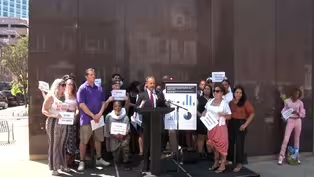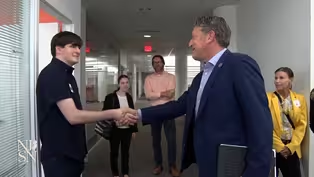NJ Spotlight News
Air traffic control changes behind Newark airport delays?
Clip: 7/31/2025 | 5m 26sVideo has Closed Captions
Interview: Randy Babbitt, former FAA administrator
Delays and cancellations at Newark Liberty International Airport have been pervasive since the air traffic control center was moved from Long Island to Philadelphia. Randy Babbitt, a former administrator with the Federal Aviation Administration, spoke with NJ Spotlight News about the move and the problems at Newark Liberty and the air traffic control system in general.
Problems playing video? | Closed Captioning Feedback
Problems playing video? | Closed Captioning Feedback
NJ Spotlight News is a local public television program presented by THIRTEEN PBS
NJ Spotlight News
Air traffic control changes behind Newark airport delays?
Clip: 7/31/2025 | 5m 26sVideo has Closed Captions
Delays and cancellations at Newark Liberty International Airport have been pervasive since the air traffic control center was moved from Long Island to Philadelphia. Randy Babbitt, a former administrator with the Federal Aviation Administration, spoke with NJ Spotlight News about the move and the problems at Newark Liberty and the air traffic control system in general.
Problems playing video? | Closed Captioning Feedback
How to Watch NJ Spotlight News
NJ Spotlight News is available to stream on pbs.org and the free PBS App, available on iPhone, Apple TV, Android TV, Android smartphones, Amazon Fire TV, Amazon Fire Tablet, Roku, Samsung Smart TV, and Vizio.
Providing Support for PBS.org
Learn Moreabout PBS online sponsorship- Severe weather is causing delays and cancellations at Newark Airport, but the problems there have been pervasive ever since the Air Traffic Control Center was moved from Long Island to Philadelphia.
The move happened over the course of two administrations, and now the U.S. Department of Transportation's Inspector General is opening an audit to determine what's gone wrong that's led to several blackouts between air traffic control and the pilots coming in and out of Newark.
I'm joined now by Randy Babbit, a former administrator with the Federal Aviation Administration, the FAA, who knows just how complicated the world of air traffic control really is.
Randy, so great to have you with us tonight.
As you know, the DOT Inspector General is auditing the move of the FAA's air traffic control from Long Island to Philadelphia.
What insight can you offer just about some of the challenges that are inherent with a move like that?
- It is complicated.
The people that work in those facilities sometimes are associated with the area where they're moving, sometimes they're not.
But I think there is a move.
The facility up in New York is a rather old one.
I think they're trying to either restore it or replace it, and perhaps moving some people.
And I think the idea, too, was to put some people into areas where they had shortages.
- Yeah, we're gonna get into the shortages in a minute.
But just in terms of the communication systems, we saw them go dark two times significantly this spring, three times total.
But are these failures the result of the Biden administration bungling the move, as Transportation Secretary Sean Duffy alleges?
- No, I wouldn't put all the blame there.
There is always, one of the things that you do when the FAA makes a request for something, it's gotta go through several channels to get approved.
And they blame the FAA, you didn't do this, you didn't do that, but you can't do it without money.
And so the Secretary of Transportation has to support you.
Ultimately, Congress has to appropriate the money.
- What can you tell us about what funding has been put behind those system upgrades now?
We saw Duffy come out in a big way, saying that they were going to make these repairs.
We know some have already been made.
What has been done?
What still needs to be done?
- You've got a shortage right now of something close to 3,000 air traffic controllers.
And it needs funding, but even more importantly, it takes time.
It's not a short process.
You don't just go out and hire somebody, give them a manual, and six weeks later, they're an air traffic controller.
It's about a two-year process.
And so even if you were full on today, and I am happy to understand that they're seeking alternative avenues to train people, which they need to do, and the retention rate is not exactly at the top of the board either.
So a lot of people in school are quitting before they finish.
And it's a tough job.
And a lot of people decide after a while they can't do it.
- I think it begs the question, for me at least, we saw this plane crash in D.C. where 67 people were killed.
And since then, we've seen video after video of all of these close calls.
And I can't help but wonder how much of this is because the job is that stressful, there are these close calls all the time, or is this because there just simply aren't enough people manning the aircrafts as they come in and out, and we potentially could see more collisions?
- Well, I think you have spotlighted, I mean, once you have an accident, remember, we went 13 years without an accident.
And that's pretty incredible when you think about it.
If we had the accident rate we had back in the '70s, we'd be losing a dozen airplanes a year.
So we've done a great job of avoiding accidents.
But today, we have a lot more air traffic, there's a lot more aircraft in the air, and so you've got a higher volume.
And at the same time, we all acknowledge there's a shortage of air traffic controllers.
- We did see Newark Airport slow the rate of traffic in and out of the airport.
Do you think that while this shortage is ongoing across the country, we need to see other airports follow soon?
- You may.
I mean, one of the things that doesn't help, and this is not assessing blame, but a lot of times you'll hear, "Well, air traffic control."
Well, a lot of these carriers, especially in the big hub and spoke operations, just look at the departure board somewhere, go to an area where one airline prevails, and look at the number of departures, say, at eight o'clock in the morning, and you might see eight or 10 airplanes all departing at eight o'clock.
That can't happen.
They only have maybe two runways.
You can't take that many people, but yet they schedule that way all the time.
I mean, I've seen pictures of a departure board where 17 airplanes were leaving from one airline in about an eight-minute period.
That's not gonna happen.
And then everybody's upset.
"Well, air traffic control delayed us."
No, air traffic control didn't delay you.
That's like saying you've got 17 people who want to back out of your driveway at the same time.
It can't happen.
You have to do them one at a time.
That's all the time we have.
Great insight, Randy Babbit, former FAA administrator.
Appreciate you coming on and offering that perspective.
Thank you so much.
(bell dings)
Sexual abuse alleged at NJ juvenile detention centers
Video has Closed Captions
Clip: 8/1/2025 | 5m 2s | Over 350 lawsuits filed alleging abuse at state-run facilities (5m 2s)
NJ bill aims at job training for 'neurodiverse' people
Video has Closed Captions
Clip: 7/31/2025 | 4m 23s | Legislation by state Sen. Andrew Zwicker offers tax credits for hiring in STEM roles (4m 23s)
Worries about Trump order targeting homeless
Video has Closed Captions
Clip: 7/31/2025 | 5m 3s | Interview: Richard Uniacke, president of Bridges Outreach (5m 3s)
Providing Support for PBS.org
Learn Moreabout PBS online sponsorship
- News and Public Affairs

Top journalists deliver compelling original analysis of the hour's headlines.

- News and Public Affairs

FRONTLINE is investigative journalism that questions, explains and changes our world.












Support for PBS provided by:
NJ Spotlight News is a local public television program presented by THIRTEEN PBS


